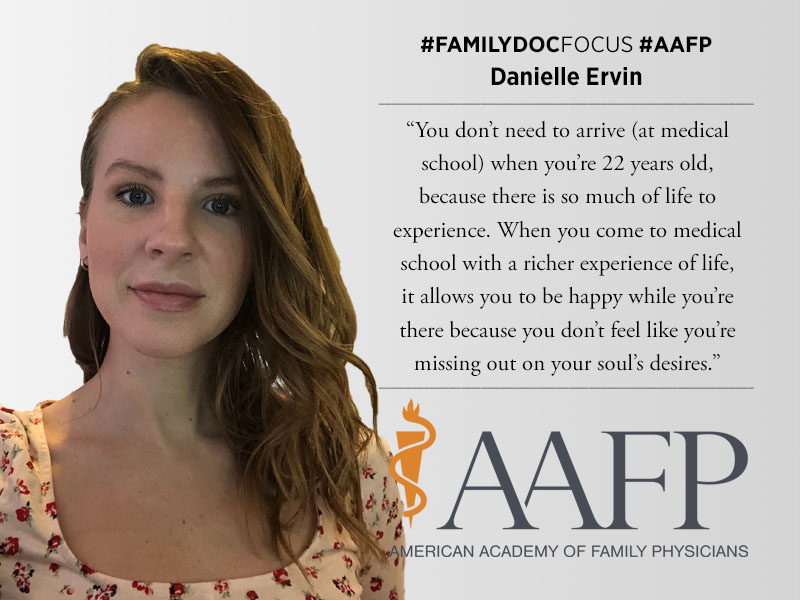Circuitous Route to Med School Provided Invaluable Experiences
September 13, 2021, 2:26 p.m. David Mitchell — Danielle Ervin has a simple message for medical students who ponder their demanding schedules and wonder when they will have time to pursue their other dreams, like traveling, living abroad, being an artist or starting a family.

“I just sit there and think, ‘Yeah, do it, live your life,’” said Ervin, a 35-year-old, second-year student at the University of Washington School of Medicine. “You don’t need to go straight through medical school, and you don’t need to arrive there when you’re 22 years old, because there is so much of life to experience. When you come to medical school with a richer experience of life, it allows you to be happy while you’re there because you don’t feel like you’re missing out on your soul’s desires.”
Ervin took her own unconventional route to medical school, full of both joy and painful struggles.
Her stepfather, who struggled with substance abuse, died when she was 16. People who were with him when he died were wary of the medical community and were too slow to call for help, she said.
Six years later, her father, who was a factory worker, survived a near-death experience with acute myeloid leukemia thanks, in part, to participation in a clinical trial for a new medication.
Both experiences eventually helped steer Ervin toward research and medical school. But as the daughter of a mom who grew up without running water in an Appalachian transplant community, Ervin wasn’t convinced college was right for her.
“I come from a rough background where you usually don’t go to university and you don’t become a doctor,” she said. “I actually didn’t go to college right after high school. I spent some time exploring other options, like becoming a Pilates teacher or a fancy bartender.”
Ervin become an academic English teacher, eventually graduating from Miami University with a degree in English literature. She worked as a teacher, writer and editor in Chile before returning home to Ohio to teach an English-as-a-second-language program and also as a tutor with international families whose children were receiving treatment at Cincinnati Children’s Hospital Medical Center.
The latter job was the final push Ervin needed to pursue medical school.
“Some of the families had children who were dying,” she said, “and I realized it was natural for me to be with people in those hard moments, and it was easy for me to interact with the kids. It was three years of in-home tutoring, so I got really close with the families.”
What wasn’t as easy was getting into medical school. Ervin went back to school for a postbaccalaureate program at the University of Cincinnati that helped her prepare for the Medical College Admission Test.
Ervin had worked as a research assistant in the humanities as an undergraduate, and she turned her attention to clinical research both at Cincinnati and again now in Seattle. Her areas of interest include substance use disorder, care of people who are incarcerated and the ethics of intergenerational care.
“The basis of my research background is addressing ethics, resource distribution, implementation science and equity,” she said. “Even in a research setting I think about patients from a narrative medicine perspective. Many people think about them as a data set. For me each of those data points is a whole human being with a nuanced story. How did we make sure the research we’re doing is actually helping the populations that we’re doing research about? I probably wouldn’t have that perspective if I hadn’t spent so much time with mentors doing literary and critical theory.”
Ervin put her communication skills to work last year as a liaison for the six campuses in the University of Washington School of Medicine’s WWAMI Regional Medical Education Program, which is a partnership the University of Washington and the states of Washington, Wyoming, Alaska, Montana and Idaho.
In the past, the six campuses each had separate but connected family medicine interest group programming, but when COVID-19 forced most FMIG activity online, the students shared their resources and events more closely. The collaborative effort allowed WWAMI to strengthen its collective FMIG efforts while maintaining the campuses’ individual initiatives and learning from each other’s successes. WWAMI was recognized by the AAFP this summer as a Program of Excellence during the National Conference of Family Medicine Residents and Medical Students.
“This was the first year that we didn’t sequester resources,” Ervin said. “We thought a lot more about, ‘How do we include everyone?’ It made things more equitable. I think we’re going to do that from now on. If we have a class — even if it’s in person — we’re going to make sure anyone can Zoom in if they want to.”
Inclusion is important to Ervin, who has another family member who struggles with substance use disorder, like her stepfather did. Ervin said this relative has “had her trust and dignity broken” by bad experiences in the health care system. She wants to be a physician who patients can trust regardless of their circumstances.
“I definitely want to be a part of the medical community that helps my teammates have a more humanized view of patients who are traditionally discriminated against in medical situations,” she said. “I care about healing relationships between medical professionals and communities that have experienced oppression in medical contexts.”
Finally, Ervin had another piece of advice for those like her from “rough” backgrounds who question whether they can make it this far.
“It is possible,” she said. “And the world needs you — someone who can model empathy toward those who have been denied many opportunities in life. Not only do patients need us, but our colleagues also need us to live our truth in their presence, so they can expand their perspective in a way they couldn’t without knowing you. You are a gift to everyone you meet.”